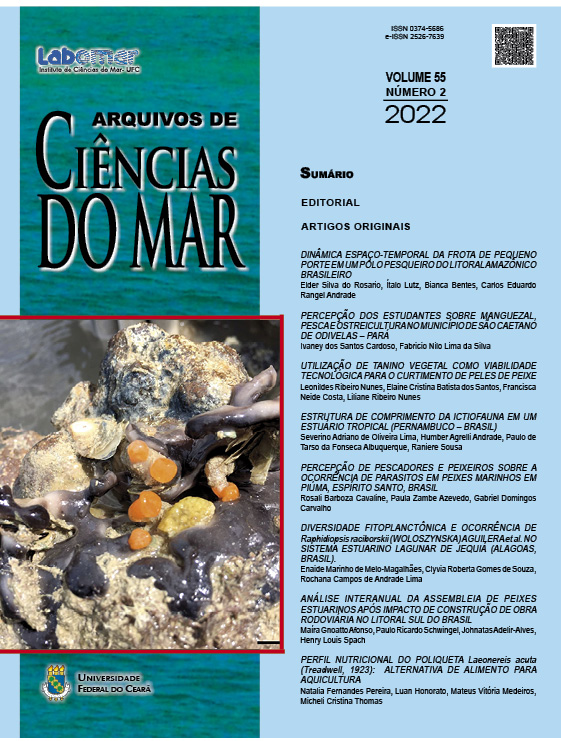RECENT BRACHIOPODS FROM SOUTH ATLANTIC OCEAN: FIRST OCCURRENCE OF THE LINGULIDAE AND ITS BIOGEOGRAPHIC IMPLICATIONS
Braquiópodes recentes do oceano Atlântico Sul: primeira ocorrência de Lingulidae e suas implicações biogeográficas
DOI:
https://doi.org/10.32360/acmar.v55i2.70993Resumen
The brachiopod fauna of the South Atlantic is significantly abundant and appears to be predominantly composed of cosmopolitan species. However, until now there was no record of inarticulate brachiopods of the Family Lingulidae in this region. The present study describes the first occurrence of lingulid brachiopods in the South Atlantic. Seven specimens were collected on the continental shelf of the Maranhão state, Northeastern Brazil, Western South Atlantic. The individuals were identified as belonging to the genus Lingula. Although brachiopods have great dispersion capability durintg their larval phase, the hypothesis that these specimens arrived on the Brazilian coast as a result of human activities cannot be ruled out.
Keywords: Lingula, subfilo Linguliformea, “Inarticulata”, inarticulate brachiopods, Brazil.
Descargas
Publicado
Número
Sección
Licencia
1. Proposta de Política para Periódicos de Acesso Livre
Autores que publicam nesta revista concordam com os seguintes termos:
- Autores mantém os direitos autorais e concedem à revista o direito de primeira publicação, com o trabalho simultaneamente licenciado sob a Licença Creative Commons Attribution que permite o compartilhamento do trabalho com reconhecimento da autoria e publicação inicial nesta revista.
- Autores têm autorização para assumir contratos adicionais separadamente, para distribuição não-exclusiva da versão do trabalho publicada nesta revista (ex.: publicar em repositório institucional ou como capítulo de livro), com reconhecimento de autoria e publicação inicial nesta revista.
- Autores têm permissão e são estimulados a publicar e distribuir seu trabalho online (ex.: em repositórios institucionais ou na sua página pessoal) a qualquer ponto antes ou durante o processo editorial, já que isso pode gerar alterações produtivas, bem como aumentar o impacto e a citação do trabalho publicado (Veja O Efeito do Acesso Livre).

